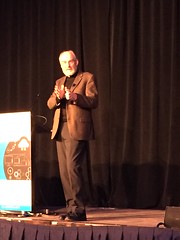A huge scientific paradigm shift since the 1700s.
We need to be knowledge centric and not information centric.
He believes in gathering information through ethnography.
In the 1980s we replaced human intelligence with systems thinking.
He studied water engineers: physical hard labor, customer management skills, social knowledge management.
They created a social space where they exchanged information.
Information centric approaches to human insight are flawed. We know more than we can say. We say more than we can write down.
Chance discovery in a physical environment. Innovation comes through chance encounters in the physical world.
We have evolved to scan data very quickly and to look for a pattern match based on recent patterns.
Small things create massive unforecastable impacts. Ordered, chaotic and complex systems. We get seduced by ordered. The excessive imposition of order causes problems within organizations.
Complex adaptive system - you can measure it as it evolves, but you don't know how it will evolve.
Organizing a a children's party:
- Chaotic which is a free for all.
- Ordered as objectives and a mission statement. It has milestones.
- Complex systems - flexible negotiable boundaries. Manage beneficial patterns.
- Complexity requires theory informed practice.
We now have a generation of specialists who cannot work across disciplines.
The ability to bring together knowledge from different disciplines is huge. Can we train people to be generalists?
Innovation is not about creativity.
Exaltation innovation: it just called out to me. Nonlinear adaptive shift. Nonlinear repurposing.
How do we allow for small noticings?
When people work, are the focused on completing the work or following the rules? What are the dominate opinions among a group? What are the outliers and why?
Carbon is not silicon (a Star Trek reference)
- Metaphor and abstraction
- Embodied, enacted and extended (limits of digital) - human beings are analogue.
- Aesthetics in cognition and language development
- Assemblages are scary - to escape an assemblage is difficult
- Ritual changes identity - rituals changes which part of the body we scandals through
- Autonomic and novelty receptive
- Epigenetic effects
- Tribes, clans and herds
Three key needs:
- Rethinking metadata and search to allow for exaptive knowledge discovery: beyond information retrieval
- From 'big data' analytics to distributed sensor networks and fractal citizen engagement
- Critical thinking and engagement with the reality of a resource poor planet
This was updated on March 11, 2016

No comments:
Post a Comment